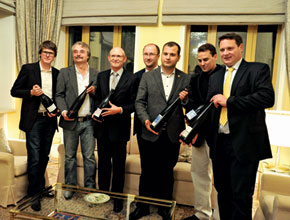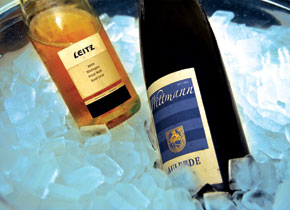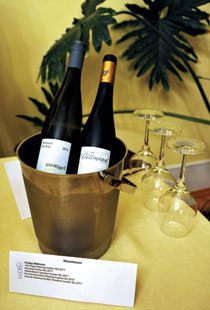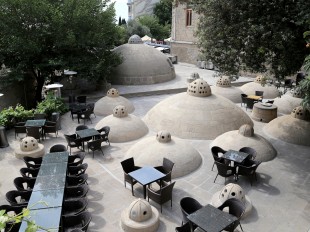Germany’s worldwide reputation for beer tends to eclipse another of its fine products, wine. Germany conventionally divides into two – the east, which produces the world’s beer, and the west which follows a long tradition of wine-making.
The genesis of German vineyards began 400 million years ago. At that time, known as the Devonian period, today’s Europe was situated in the tropics south of the equator. Along the shore of the primeval ocean various sediments of the Old Red Continent mingled with silt from the sea, fine clay, sand, mussels and coral-reefs. The differences in these sediments that formed the land over millions of years explain the fascinating diversity of taste in today’s German wines.
German traditions in Azerbaijan
Azerbaijan is no stranger to German expertise in viticulture and wine-making. German settlers who migrated here in the 19th century established vineyards and produced wine and brandy in what is now Ganja, Tovuz and Shamkir. The wines and spirits of the Vohrer and Hummel brothers were sold across the Russian Empire, and won awards in European competitions. Their legacy can be felt in the wines produced in those regions today. Now customers in Baku can compare those Azerbaijani wines with wines from the settlers’ homeland, Germany.
Reinhard Löwenstein, a German wine-maker who was invited to a presentation of German wines in Baku, told us a little about wine-making in his country. But first, a few words about the presentation that was organized by the German Embassy in Azerbaijan and Caspian Crystal at the Chirag Plaza. Dozens of German wines and non-alcoholic drinks were presented by their production companies. Guests and wine connoisseurs gathered to sample the wares at the German ambassador’s residence. Ambassador Herbert Quelle welcomed all the guests and hoped that Azerbaijani customers would appreciate the German wines that are going to be sold by Caspian Crystal.
Aristocratic….
Reinhard Löwenstein, who owns vineyards in the western part of Germany, tried to dispel our doubts about Germany and beer.
Indeed, beer is the favourite drink in Germany. However, in the western part people prefer wine as an aristocratic drink. And there is a difference between German wines and, for instance, French or Italian ones. It’s a question of terroir or environment. One important aspect of our terroir is the relatively cold climate of the west and north. In a culture that is characterized by a longing for Mediterranean sun, this statement may be astonishing. Contrary to the common idea ‘the more sun, the better the wine’, it is exactly the reverse with wines that are defined by their refinement, elegance and filigree.
Reinhard Löwenstein mainly cultivates the Riesling variety of grape which is grown in Germany, Austria and other countries with a rather cold climate. This old variety has an unbelievable vitality which enables it to withstand cold, rain, heat and drought.
It forms roots up to 12 m deep into the rock which sublimates that taste of slate into the grapes. Of course, if we stick to the rules, in order to guarantee the necessary contact between the roots and the slate, the vines should be at least eight years old and the vineyard should be planted with more than 7,000 vines per hectare.
….and classical
 Third from left German Ambassador Herbert Quelle, second from left Reinhard Löwenstein with other guests
Third from left German Ambassador Herbert Quelle, second from left Reinhard Löwenstein with other guestsThe German wines went down very well with all the guests at the wine-tasting party, which appropriately enough was accompanied by classical music. As Azerbaijani wine-making recovers from the devastation of the late Soviet period, it will be interesting to see the connections restored, and develop into healthy competitition.




.jpg)